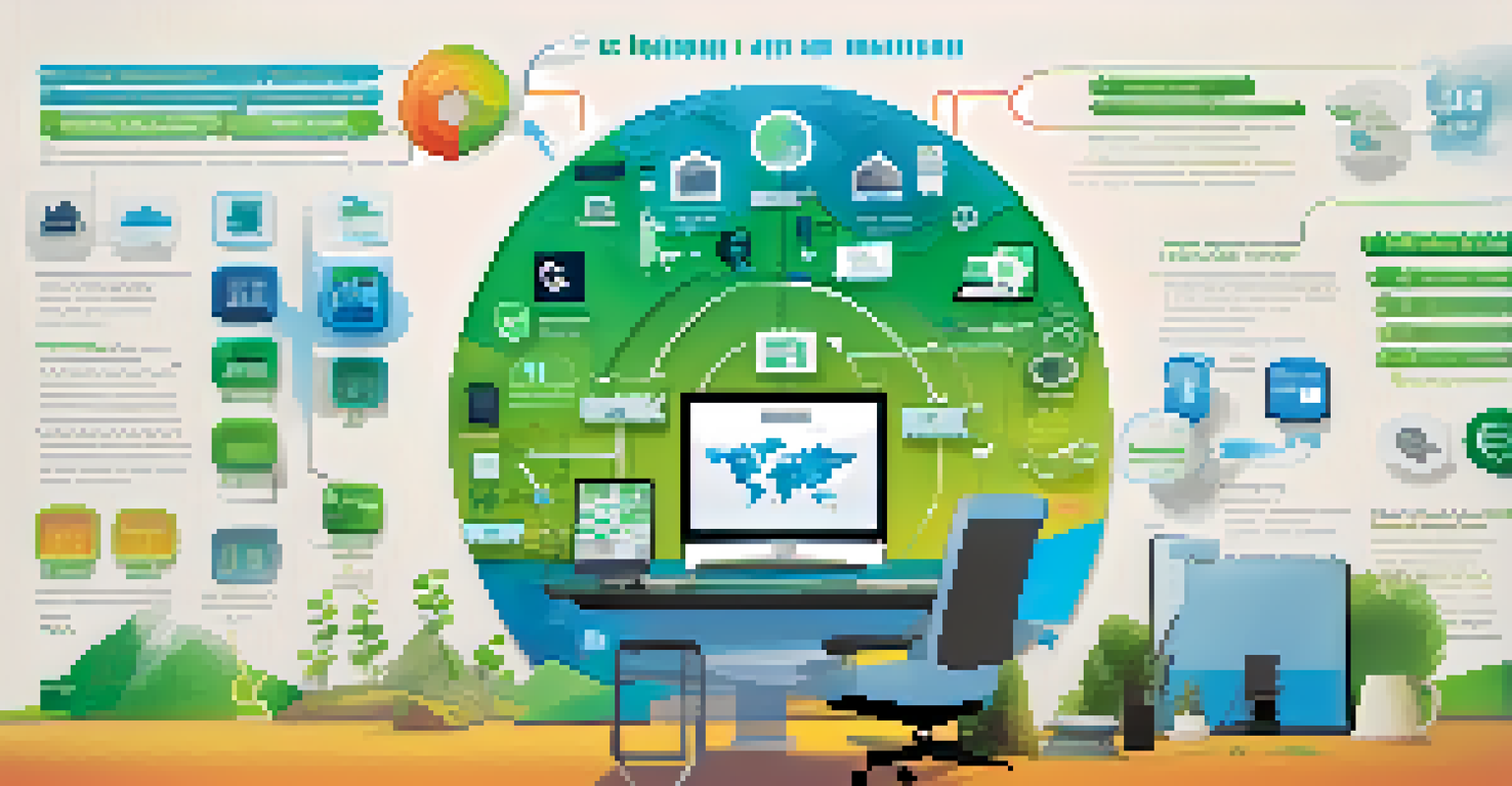The Impact of Remote Work on Silicon Hills' Tech Scene

Understanding Silicon Hills and Its Tech Landscape
Silicon Hills, often referred to as Austin's tech hub, is a vibrant ecosystem filled with startups and established tech giants. This area has become a magnet for innovation, attracting talent from all over the country. The unique blend of culture, lifestyle, and opportunity makes it an ideal place for tech professionals to thrive.
Remote work is not just a trend; it's a paradigm shift that empowers people from all walks of life to connect with opportunities that were once beyond their reach.
In recent years, the tech scene has been rapidly evolving, driven by advancements in technology and changes in work habits. With the rise of remote work, companies have begun to reassess their operations and how they connect with employees. This shift is not only transforming workplaces but also the dynamics of recruitment and collaboration.
As remote work continues to gain traction, the landscape of Silicon Hills is adapting to meet new demands. Companies are exploring flexible work arrangements, which directly impact their ability to attract talent and compete in the marketplace. Understanding this shift is crucial for anyone interested in the future of the tech industry in this region.
The Rise of Remote Work: A Game Changer
Remote work has rapidly transitioned from a temporary solution during the pandemic to a preferred mode of operation for many tech companies. This shift has allowed professionals to work from anywhere, breaking geographical barriers that once defined the tech workforce. It also opens up opportunities for companies to hire talent from diverse backgrounds and locations.

As a result, traditional office spaces are becoming less of a necessity, prompting companies to rethink their real estate strategies. This change not only saves costs but also fosters a more inclusive work environment where employees can thrive regardless of their location. The flexibility of remote work is appealing, especially for those seeking a better work-life balance.
Remote Work Transforms Tech Culture
The shift to remote work is redefining company culture, requiring organizations to adapt their communication and collaboration methods to keep employees engaged.
However, the transition to remote work is not without its challenges. Companies must find new ways to maintain company culture, ensure productivity, and foster collaboration among remote teams. Addressing these challenges requires creativity and a commitment to adapt, but the potential benefits can be substantial.
Impact on Workforce Diversity and Inclusion
One significant advantage of remote work is its potential to enhance diversity within the tech workforce. By enabling companies to hire from a broader geographical area, organizations can tap into a wealth of diverse perspectives and experiences. This diversity can lead to more innovative solutions and a richer company culture.
The future of work is not about where you are, but how effectively you can collaborate and innovate with your team.
Moreover, remote work can provide opportunities for individuals who may face barriers to traditional employment settings. For example, people with disabilities, caregivers, or those living in rural areas can now access jobs that were previously out of reach. By prioritizing inclusivity, Silicon Hills companies can create a more equitable tech scene.
However, simply hiring a diverse workforce isn't enough; companies must also commit to fostering an inclusive environment where all voices are heard. This requires intentional efforts to promote collaboration and communication among team members, regardless of where they are located. The tech scene in Silicon Hills stands to benefit immensely from these inclusive practices.
Changes in Company Culture and Collaboration Methods
With the rise of remote work, the traditional notion of company culture is evolving. Many organizations are now focusing on building a strong virtual culture that keeps employees engaged and connected. This shift requires a rethinking of how teams communicate, celebrate achievements, and maintain camaraderie.
Virtual team-building activities, regular check-ins, and open lines of communication have become vital components of maintaining a positive work environment. Companies are investing in tools and platforms that facilitate collaboration and enhance the remote experience. This effort is crucial in ensuring that employees feel valued and part of the company, regardless of their physical location.
Diversity Enhanced by Remote Hiring
Remote work enables tech companies to hire from a broader talent pool, fostering diversity and inclusivity within the workforce.
However, fostering a cohesive culture in a remote setting can be challenging. Companies must prioritize transparency and inclusivity to overcome the barriers that distance creates. By doing so, they can create a workplace where everyone feels connected and empowered to contribute.
The Influence of Technology on Remote Work Practices
Technology plays a pivotal role in enabling remote work, and its influence is only growing. With the rise of collaborative tools and communication platforms, teams can work together seamlessly, regardless of their location. This technological advancement is helping to bridge the gap between remote employees and their in-office counterparts.
Additionally, advancements in cybersecurity are making remote work more secure, allowing companies to protect sensitive information while their teams work from various locations. As tech companies in Silicon Hills embrace these innovations, they can ensure that their operations remain efficient and secure.
However, the rapid pace of technological change can be overwhelming. Companies must stay informed about the latest tools and best practices to ensure they are maximizing their remote work capabilities. Embracing technology thoughtfully can lead to improved productivity and employee satisfaction.
Challenges of Remote Work for Tech Companies
While remote work offers numerous benefits, it also presents unique challenges for tech companies. One of the most pressing issues is maintaining effective communication among remote teams. Misunderstandings can easily arise when team members rely solely on written communication, which can lead to frustration and decreased productivity.
Additionally, the lack of in-person interactions can make it difficult for employees to build relationships and trust with their colleagues. This can lead to feelings of isolation, which may affect overall job satisfaction and mental well-being. Companies need to be proactive in addressing these challenges to create a supportive remote work environment.
Tech Innovations Drive Remote Work
Advancements in technology are crucial for supporting remote work, ensuring seamless collaboration and security for distributed teams.
To overcome these obstacles, organizations should invest in training and resources that promote effective communication and collaboration. By providing employees with the tools they need to succeed, companies can turn the challenges of remote work into opportunities for growth and improvement.
The Future of Remote Work in Silicon Hills
As remote work becomes an integral part of the tech landscape in Silicon Hills, its future is looking promising. Many companies are recognizing the advantages of flexible work arrangements and are likely to continue offering remote options even post-pandemic. This shift could lead to a more dynamic and innovative tech ecosystem.
Moreover, the long-term effects of remote work could reshape the entire tech industry, influencing everything from office layouts to recruitment strategies. Companies may invest more in technology and resources that support remote collaboration, ultimately enhancing their overall efficiency and productivity.

However, the success of this transition will depend on how well organizations can adapt to the changing landscape. By embracing the opportunities that remote work presents, Silicon Hills can continue to thrive as a leading tech hub while fostering a culture of innovation and inclusivity.